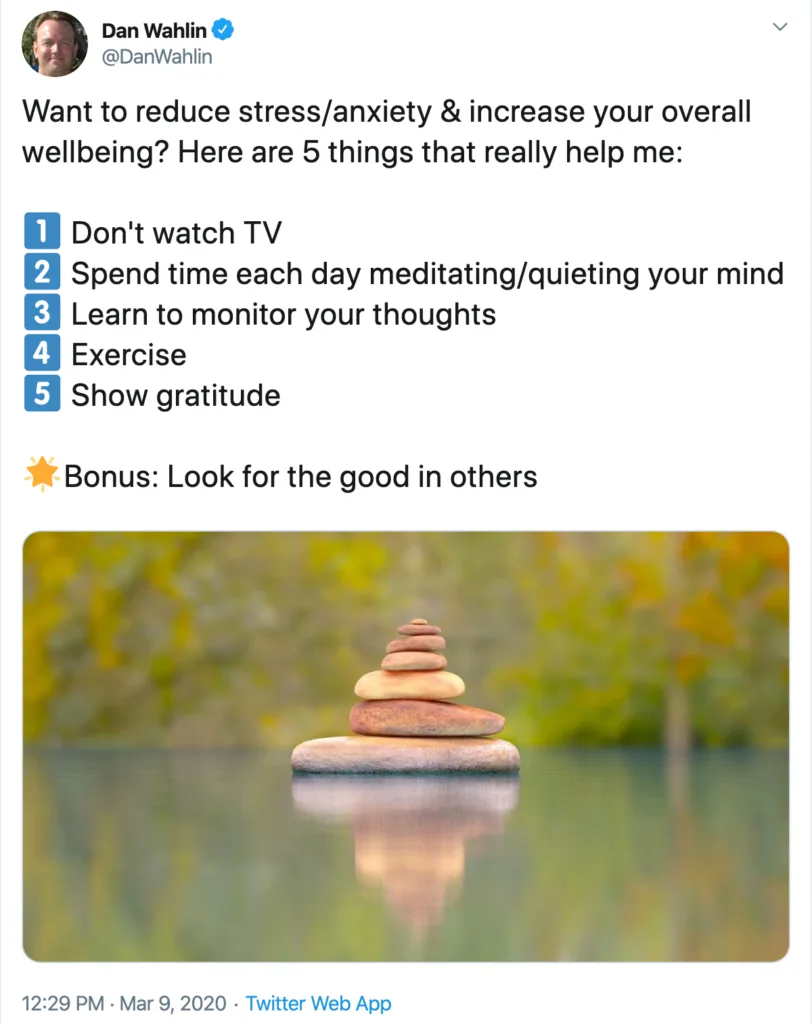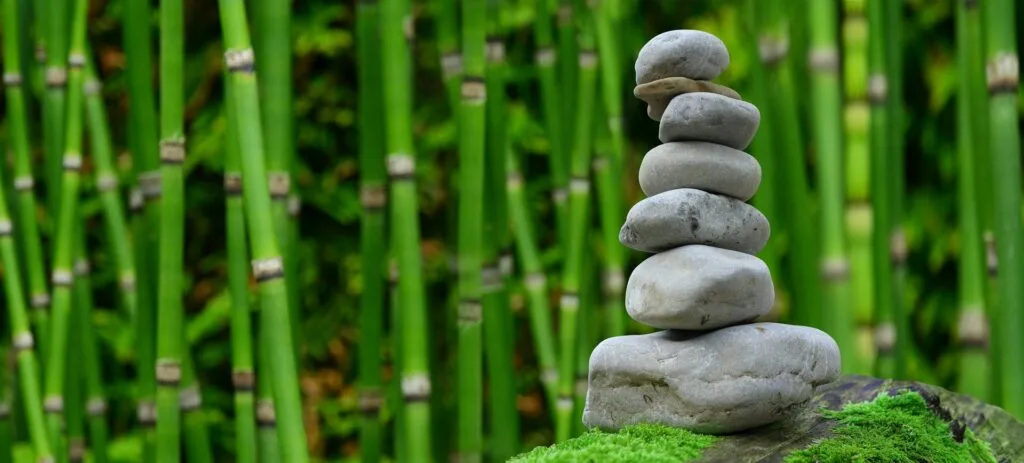
Zen Garden Meditation by EliasSch
Have you struggled much with anxiety or worry in your life? They can be easy to avoid when things are going good, but how do you handle them in more stressful situations? What can you do to help minimize anxiety, worry, and stress in your job, family, and other areas of life?
As someone who has struggled with anxiety and worry from time to time over the years I asked myself the same question and decided that I needed to take action. This post details a few strategies and actions that have really helped me in a big, big way. I hope you find them useful as well - I’m living proof that they can work. So what was I anxious or worried about? Well…a lot of things.
Everybody is different of course, but for me personally I’d be anxious about how I’d play in a sporting event (not simply nervous, but anxious and stressed out), I was anxious about how I’d do on a quiz or test at school, I was anxious and quite honestly fearful about taking certain classes because someone said they were “really hard” (they didn’t end up being that hard it turns out), I was anxious about what people thought about me and if they “liked” me, I was anxious about world events that were happening (coronavirus anyone??), I was anxious about talks I had to prepare for and give at conferences, and the list goes on and on. It’s mentally and physically draining to say the least.
Anxiety and worry were something I experienced even as a little kid apparently. While I don’t remember much from my younger years, I do remember receiving the “Head Worrywart” award from my 2nd grade teacher. I was happy to receive any “award” at that age but obviously didn’t understand what she was implying at the time. On a side note, who gives out that kind of “award” to a little kid? :-)
Anxiety was so bad at times before a given semester started in college that I’d literally sleep for nearly 3 days before the first day of class. I was *that* worried, anxious, and stressed out over how I’d do and if I could *still* get good grades. Ridiculous? Yeah - in hindsight the way I dealt with that scenario and others was absolutely ridiculous. But looking back I now realize “I didn’t know what I didn’t know”.
I’m guessing that you can relate to some of these experiences and probably have many of your own that you can add to the list. If there’s one thing I’ve learned about being anxious and worried it’s that you’re not alone. Far from it! Many people struggle with severe anxiety that holds them back from reaching their true potential. Some people hide it better than others, some are fortunate to not have to deal with it as much, and still others have learned techniques to deal with it from their parents or on their own.
If older me could talk to younger me I would’ve told myself to “chill out” and relax. Being anxious and worried doesn’t help you in most scenarios (although it can act as a motivator or a depressant for some). If you’ve ever dealt with anxiety you know that it’s not quite as simple as deciding to “stop being anxious”. The younger less experienced version of me didn’t have the necessary skills or tools to deal with the problem.
The upside of my anxiety and stress was that instead of caving into it, it actually helped motivate me to succeed in school, sports, career, life, etc. However, it also took a toll on me and in my early 40s I realized I needed to make some serious life changes to be less stressed out, less anxious, and enhance my overall wellbeing. I knew that it would eventually affect my health, mental state, relationships, and more if I didn’t find a way to deal with it better.
So what did I do? While there are many actions you can take to decrease anxiety, here are 5 specific ones that I recommend.
Actions You Can Take to Reduce Anxiety and Worry
As I hit my 40s I was motivated (due to a few life scenarios that happened) to change things up and started researching anything I could find on the subject of anxiety and worry. I started reading book after book on the subject to learn more.
The first book I remember reading was How to Stop Worrying and Start Living by Dale Carnegie which I highly recommend. It’s an “oldie but goodie”. In addition to that book and many others, I researched how the mind worked, the role of the amygdala and prefrontal cortex (as well as other key areas of the brain), how thoughts work, meditation techniques, mindfulness, and other strategies and practices that can be used to reduce anxiety/stress/fear and increase overall wellbeing. Researching these topics became a hobby that I really enjoyed and still enjoy today.
Although I’ve talked with a few close family members and friends about what I’ve learned and what I do, I’ve never publicly shared information about how it’s impacted my life. The younger me would never open up about these struggles and what I’ve done to deal with them. I mean come on, someone may not like what I have to say right?! Fortunately, while the older me respects others’ opinions and constructive criticism they may send my way, I don’t let other people determine how I feel.
With all of the seemingly non-stop negative events going on in the world I put out this tweet recently to provide some simple guidance to people who may be struggling with stress and anxiety:
Here’s more information about these 5 actions and why I chose them.
1. Don’t Watch TV
This might be the simplest change I made to reduce stress, anxiety, worry, and fear. While there are certainly some good shows, documentaries, and movies on TV, you have to go out of your way to find them. Several of the shows and news stations prey upon people’s fears and sadly make money off of triggering anxiety and worry in viewers.
The number one benefit of turning off the TV is it forces you to focus your attention elsewhere and if you use the time wisely you won’t miss TV at all. Another side effect is that you aren’t bombarded with constant negativity…especially from the media.
Go look at the website for your favorite news network when a crisis is happening. Why are the majority of articles and videos about the crisis? Because people need to hear about it in 100 different ways? No (and I realize I’m stating the obvious here), because it keeps people glued to the TV or to the website which makes the media company money. They could care less if you’re stressed out over the events. In fact, the more stressed you are the more you feel like you need to “tune in” and make sure you don’t miss anything.
Turn off the TV and notice how much better you feel! I promise the world will still be there and things will be fine. I still watch shows on NetFlix, Curiosity Stream, Disney+, various apps, etc. but I limit my time to a few hours a week. I keep up with the news by spending a few minutes a day visiting different news sites (keeping in mind that what they publish is geared toward making money). I never feel out of the loop about world events as I talk with friends and I quite honestly don’t miss TV at all. I spend the time I save on more worthwhile activities.
2. Spend Time Each Day Meditating/Quieting Your Mind
This is the biggest change I made in my life by far. It was a lot harder than simply turning off the TV, but it’s worth it. I mentioned earlier that the younger me didn’t have the necessary tools and skills to deal with anxiety, stress, and fear. My mind was like a stormy ocean with huge waves coming and going depending on the situation. Sometimes I’d ruminate as a mental wave hit and it’d go from being a smaller 5 foot wave to over 100 feet in a matter of minutes.

If I had a mental surfboard maybe that’d be fun, but I definitely didn’t have one. I wanted calm seas and it was rare to have them with everything going on in life. For me personally, that’s where meditation helps. With enough practice you can learn how to “calm the seas of your mind”.

Sound a bit “hippie” or something only monks would do? I thought that at first but quickly realized I was wrong. I didn’t know what I didn’t know (yet again). Meditation turned out to be extremely helpful and worthwhile.
Here’s a challenge for you, go into a quiet room, sit in a comfortable position, close your eyes, and start counting your in and out breaths. How long did you go before your mind jumped to other thoughts and you completely forgot about your original intent of counting your in and out breaths? For me, it was hard to get past 5 breaths without forgetting what I was there to do.
I can honestly say that many of my first attempts at “meditation” were absolute failures. I felt like I sat there with my eyes closed, listened/felt my breathing for a few seconds, and then immediately jumped to thinking about things that were stressing me out. Then other thoughts like, “You can’t do this!”, “Why are you wasting your time?”, “This doesn’t work!”, came to mind and I actually felt bad about an experience that was supposed to make me feel good. But, I kept at it and slowly became better and better at focusing on my breath and calming my mind.
So how do you get started? I’d recommend starting by sitting in a quiet place, closing your eyes, and listening/feeling your breath (inhalations and exhalations) for 60 seconds. If a thought pops into your mind (which it absolutely will), treat it as a cloud floating by and then switch back to focusing on your breath.
If you’d like official guidance, information about research studies, etc., there are many books available. Here are a few I’ve enjoyed:
- Meditation for Beginners by Jack Kornfield
- Meditation is Not What You Think by Jon Kabat-Zinn
- The Untethered Soul by Michael A. Singer
- The Little Book of Being by Diana Winston
- Many more…
I think using an app, audio recording, or video is the best way to get started initially. Once you get more experience you can do various meditation practices on your own. Here are a few of the apps on my phone that I use:
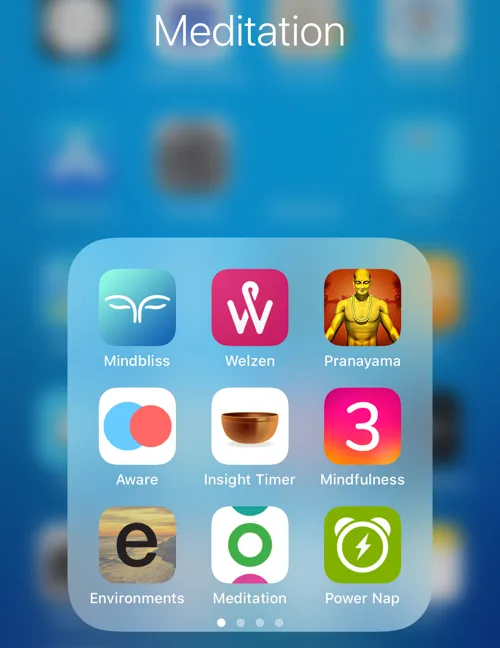
Set aside 60 seconds a day to start, then move up to 5 minutes, 30 minutes, and so on to practice. You can do it on the bus or riding the subway or train on the way to work (please don’t do it while driving :-)). It made a huge difference in my life for “calming the seas”. A nice side effect is by practicing meditation and learning to focus on calming my mind I became more focused during work and in other areas of life as well.
3. Learn to Monitor Your Thoughts
There’s a term called “mindfulness” that you’ll hear a lot if you dive more into meditation. While there are several definitions of it, here’s one that I like:
Mindfulness
A mental state achieved by focusing one’s awareness on the present moment, while calmly acknowledging and accepting one’s feelings, thoughts, and bodily sensations, used as a therapeutic technique.
Mindfulness is all about being aware of what you’re thinking about in the present moment, understanding how you’re feeling, and accepting emotions that may be uncomfortable.
How has being more “mindful” helped me? One of my #1 places to get stressed out (on occasion) is the shower. You’d think that’d be relaxing and it normally is, but because I have nothing else to do there my mind starts racing about the day’s tasks, someone who responded rudely to an email, that person I helped that didn’t even say “thanks”, something my wife said, and on and on. My old self would let those thoughts run rampant and before I knew it a little 1 foot mental wave was 100 feet tall and completely crushing me. I could literally make myself mad, stressed out, anxious, or (chose some negative emotion) in the space of 5 - 10 minutes.
That’s not the case now. Why? Because I’m able to be “mindful” of what I’m thinking about, much more aware of how I’m feeling, and better able to monitor my thoughts and emotions overall. A person who is very mindful often times has a high emotional intelligence (I’m still working on that one :-)). Go online to any social media site and you’ll find that many people aren’t mindful at all. They literally let their emotions at the present moment dictate what they type. Typing with emotion might possibly be the stupidest way to type. If you’ve ever sent an email that you later regretted you know what I mean. By being more mindful you’ll find many scenarios aren’t stressful anymore.
For example, when I get allergies or if I’m really tired I tend to be pretty cranky. That has led to family scenarios where I turned something little into something big. I won’t say I’m even close to perfect with that now, but I can say with confidence that I’m much better at catching when I feel that way and then avoiding scenarios that I’m not up to handling well at the time.
Someone’s rude to you in a meeting, online, or on a call? If you’re mindful you’ll be able to notice your emotions, feel anger building up, feel your pulse increasing, feel a hotness in your body (or whatever feeling you get), and then quickly counter with a thought like, “Relax and calm the mental waves before responding.”
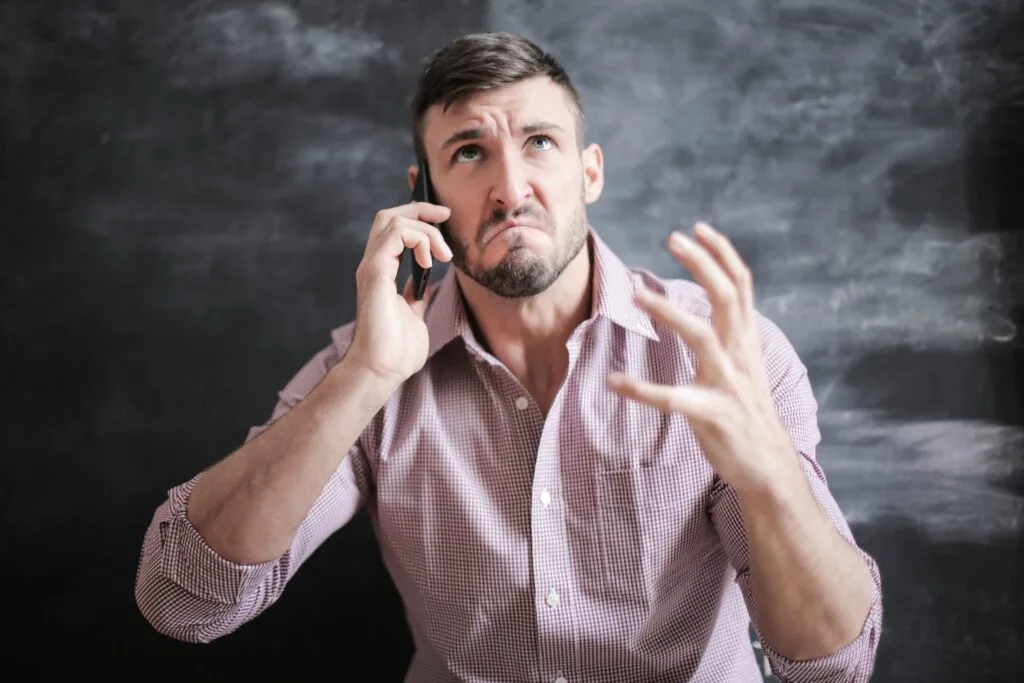
I came up with a term I call the “golden pause” which is the ability to have someone talk rudely to me, catch how I’m feeling about it, pause for a few seconds to calm the waves, and then respond (hopefully) with more control. No, I still have my moments but I’m much better than I used to be and I’m confident in saying that you will be too if you consistently practice and work at it. It’s important to note that “mindfulness” isn’t necessarily the same thing as “meditation”. You can be mindful at any moment and at any time whether it’s a good or bad situation.
4. Exercise
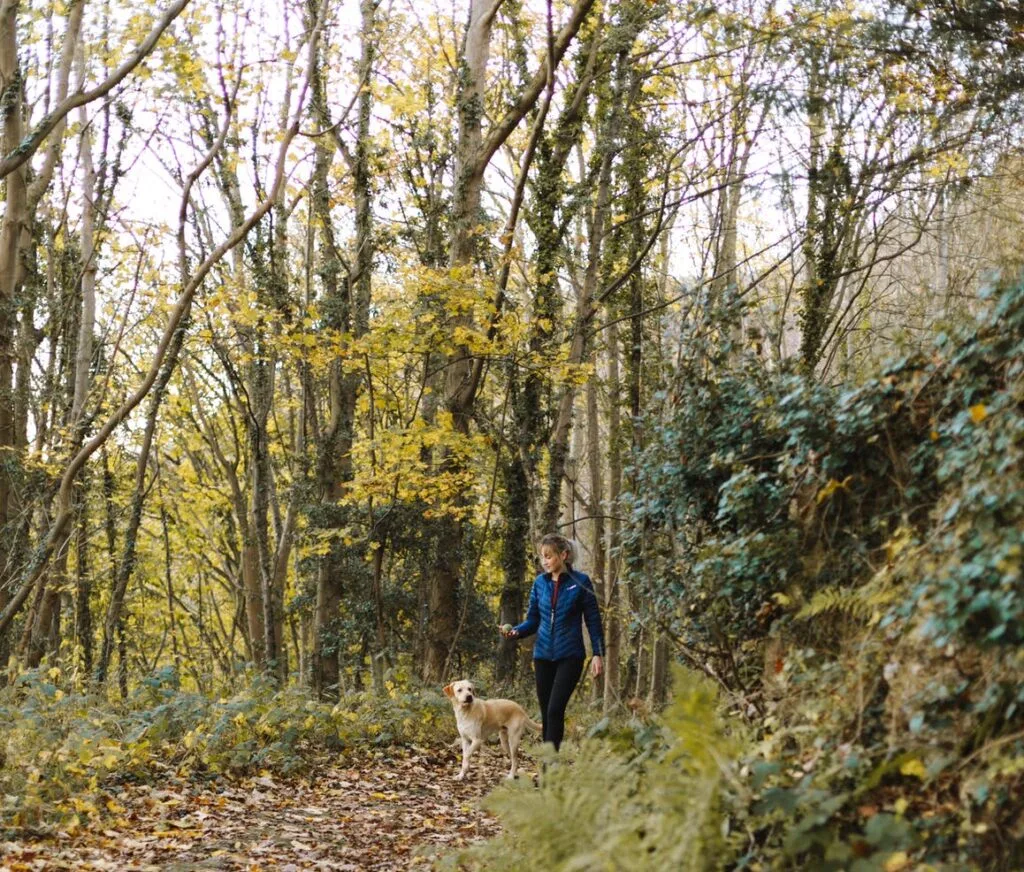
I’ll have to admit that exercising was a lot easier when I was playing sports in high school and college. As I’ve gotten older and traveled a lot for business, I’ve come up with plenty of excuses to avoid exercising. However, what I’ve found is that exercise is extremely critical to calm the mental waves and help reduce anxiety. I definitely notice a change when I don’t do enough exercise. The topic has been covered so much in the media, research reports, magazine articles, blog posts, etc. that I won’t bore you with more details here because everyone knows they should exercise more.
The bottom line is getting outside has many positive mental benefits and I’ve found that alone can help calm anxiety and worry. Getting outside and exercising obviously has many physical and mental benefits as well. If you’re not spending at least 30 minutes exercising a day I’d challenge you to do that. Since I like to listen to a lot of audio books on various topics, going out for a jog or walk is a great way to listen and learn while also benefiting my mind and body.
You can even meditate while walking!
5. Show Gratitude
When was the last time you expressed gratitude for all of the things you have in life? Unfortunately, in today’s world people tend to focus on everything that’s wrong in the world or on what they don’t have. The Jones’ bought a fancy new car and I want one too! Tim’s family went on a super cool vacation to Europe and we can’t afford that right now. Michelle’s kid is excelling in school and mine is struggling. The list goes on and on.
Someone will always be doing “better” than you and have something you want. That’s a simple fact of life. It’s unfortunate that social media tends to switch our focus to what we don’t have, how we compare with others, and forget all of the good things we have going in life.
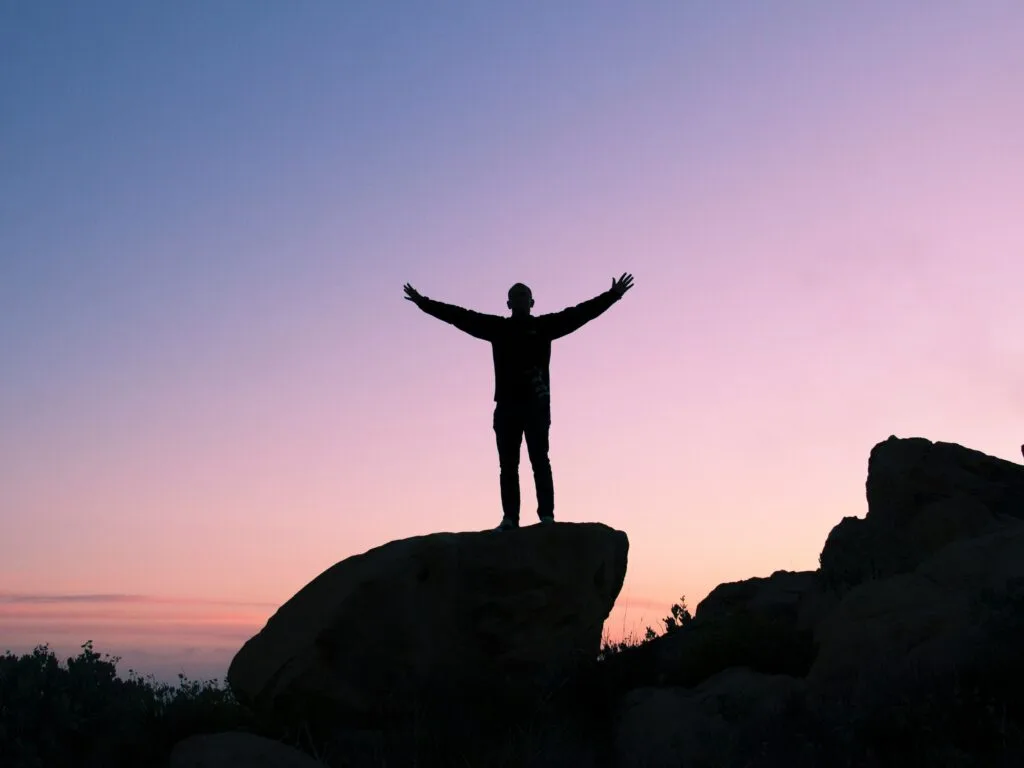
One of the single biggest changes I’ve made in my daily routine is to wake up and take a few moments to express gratitude for what I have in life. I have a phenomenal wife and kids, the best parents a person could ask for, a job I enjoy doing, no major health issues, great friends, and more “stuff” than I actually need. I make it a point to show gratitude and acknowledge the things I do have in the morning to start my day off. It’s amazing how this one simple action can affect your whole day.
6. (Bonus) Learn Breathing Exercises
I couldn’t include this one in the tweet I mentioned earlier (due to size limitations) but it’s something that has had a huge impact on my life. If you need a tool to help before, during, or after stressful situations then look no further than breathing exercises.
For example, I like to do something called Box Breathing that I learned from a book called Unbeatable Mind: Forge Resiliency and Mental Toughness to Succeed at an Elite Level written by former Navy SEAL Mark Divine. There are many variations of this technique, but to get started you inhale for 5 seconds, hold for 5 seconds, exhale for 5 seconds, and then make sure all of the remaining air is out the last 5 seconds. Repeat that for as long as you’d like and then expand the times as you get better at it. I’ll do it before going on stage to give a talk at a large event or in other scenarios where I want to relax so that I can do my best.
I use an app called Pranayama on my phone that helps me time these exercises and provides additional breathing exercises:

Additional Actions
There are many more ideas that I could discuss to help with calming anxiety and stress. Here are a few others to consider:
-
Look for the good in others - even those you don’t like or who don’t like you. I’m not much of a “turn the other cheek” kind of guy (anyone who knows me can attest to that), but rather than focusing on the negative in others look for the positive and watch how that changes how you view them. This applies to groups you may not like, people with opposing political or professional views, etc.
-
Get your finances in order. If you’re spending more than you make get a budget in place and stick to it. In my early married years my wife and I had very little money so we used a budgeting technique we learned that organized all expenses into columns (food, clothes, entertainment, rent, car, insurance, etc.). It worked wonders for saving money even when we didn’t have much to save at the time and gave us a feeling of financial freedom.
-
Spend more time reading - pick anything! I wouldn’t have learned about what can be done to help with stress and anxiety without reading. I read or listen to something on the subject nearly every day. Although I enjoy listening to music as well, when I’m exercising (walking/jogging) or driving I turn on Audible books many times and leverage the time to learn.
-
Play a puzzle game like Sudoku, a cross-word puzzle, or something similar each day. I’ve significantly increased by ability to focus by playing a few games of Sudoku every day. While I’m focused on the game it’s harder for anxiety/worry to affect me.
-
Minimize your interactions on social media. Life will still go on without you sharing your pictures, opinions, and status updates. The added benefit is that you’ll miss seeing the negative aspects of social media as well. You see people doing something amazing and wish you could do that so you feel a little down, someone received a raise but your company isn’t doing anything to bump your salary, etc. I stopped following people that use social media to vent every time they were frustrated about something (pro tip - don’t do that), or if they share why everyone else is wrong if their political beliefs aren’t the same as theirs, etc. While I’m still very active on Twitter, I’ve cut back on how often I visit and tweet.
-
Stop looking for outside validation from others. I’m as guilty as the next person when it comes to this one. Everyone wants to be liked, adored by your social media fans, have songs of praise sung about you, etc. :-) If there’s one thing I’ve learned in life it’s that outside validation will never be enough no matter how many friends or social media followers you have. Having thousands or millions of “followers” on social media doesn’t provide proof that you matter. How many famous people have died and never heard about again? There’s a great quote from Marcus Aurelius’s Meditations about this (translated and adapted by Gregory Hays). He says, “It never ceases to amaze me: we all love ourselves more than other people, but care more about their opinion than our own. If a god appeared to us — or a wise human being, even — and prohibited us from concealing our thoughts or imagining anything without immediately shouting it out, we wouldn’t make it through a single day. That’s how much we value other people’s opinions — instead of our own.” You have to build confidence from the inside out (not outside in) and practicing meditation and mindfulness can help you overcome your dependency on outside validation.
-
Help others. If you’ve ever dedicated time to help others in need you know how good it makes you feel. It’s a great way to reduce your anxiety given that often times you realize how good you have it compared to what others are going through. It also helps develop more empathy - something the world seems to be lacking now days. Volunteer at a homeless shelter, food bank, animal shelter, school, or really anywhere that lets you help others.
-
What music do you listen to? Sometimes when I’m running I like some “pump me up” type music to get going. Or, I might have a task I need to get done that requires a little extra motivation to get started. In those cases I’ll occasionally listen to alternative/nu metal music, some hard rock music from my younger years, or something similar but it’s pretty rare now. I’ve really cut back on music that I know causes stress or doesn’t have a positive “vibe” to it. Music is such a personal decision that I don’t have any specific recommendations here. I’d simply encourage you to review what you listen to and ask the question, “Is this helping me manage my stress and anxiety or making it worse?”.
-
Do a “technology detox”. How many times a day do you check email, social media, websites, and other information sources? If you’re like me you probably don’t know the answer but can safely say, “Way too much!”. Try cutting back on that usage and stop using your phone so much.
Conclusion
I wish I could finish up by saying that these 5 actions have resulted in mastering all aspects of my life! That’s not the case though and I don’t expect to ever achieve that level of mastery. I still get anxious and worry about things from time to time, get angry over certain scenarios, overreact in some scenarios, and still fear doing certain things. The reality is I struggle with anxiety and worry like everyone else on the planet. It’s called being human.
My struggles are much more manageable than before I started implementing these actions and others. There are many situations that would’ve sent me into a rage or completely ruined my day that I let pass by now. I’m able to calm the mental waves much easier before they turn into a raging storm. Part of that is age and experience, but a lot of it is what I PRACTICE and DO on a daily basis.
If you’re struggling with anxiety/worry/fear right now I’d challenge you to sit back and take stock of your life. What are you doing to help yourself? What are you doing that you know you should stop? Would implementing any of these actions (or others) in your life help out? Having said that, if you don’t think you can manage what you’re going through on your own then make it a point to seek out professional help. It takes a strong person to ask for help from others, it’s absolutely not a sign of weakness.
Some people refuse to acknowledge that they need help or that they need to change. Don’t be one of those (stubborn) people. It’s easy to do nothing and pretend that everything is great when you know deep inside it’s not. I finally realized that right around the time I turned 40. What if I would’ve implemented some of these actions in my 20s or 30s though? How would my life and my family’s life have changed?
My challenge to you is to give a few of these ideas a try and see how you can reduce your stress and anxiety while enhancing your overall wellbeing. I’m living proof that it can be done.
Have other actions you take that help you manage stress, anxiety, and worry? Leave a comment to let me know about what you do.

